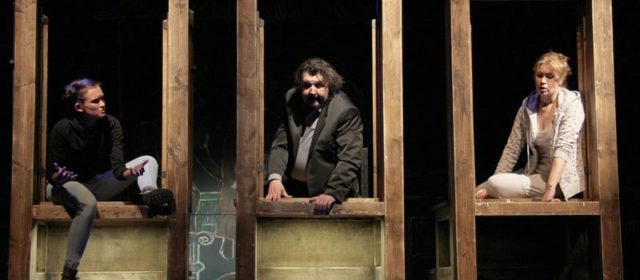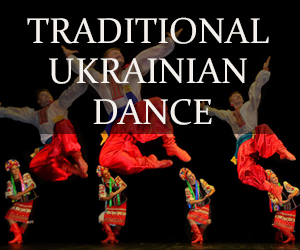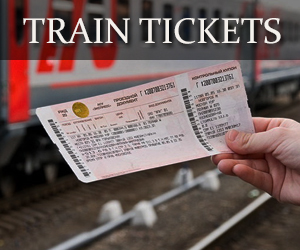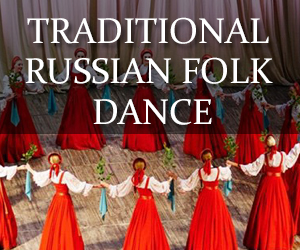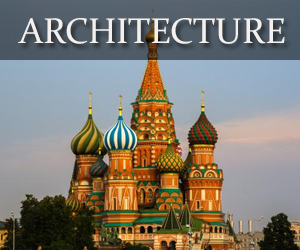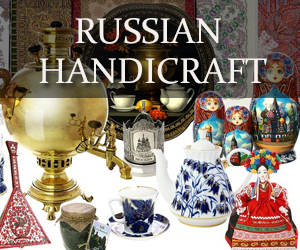Russian drama theatre, while it gets less attention from foreign visitors than the other performing arts, is enriched in just as much tradition. Many classical Russian playwrights are as famous on world stages as they are at home, and many of Russia and Ukraine’s most historic theatrical buildings are used specifically for drama performances. For those less familiar with Russian drama and comedy, we’ve provided a brief background of the art form, as well as a list of the best drama theatre to attend while visiting Russia and Ukraine.
See also: Classical Music, Opera and Ballet
Russian Drama Theatre Background
Russian drama theatre has its roots in traveling performers – actors, singers, musicians, dancers and animal trainers – known as skomorokhi (скоморохи). Emerging from the peasantry and restricting their activities largely to that class, skomorokhi became an integral part of the cultural life in Kievan Rus’ by the 11th century.
Often incorporating elements of social satire and protest against the church and ruling classes, skomorokhi soon found themselves at odds with ecclesiastical authorities. Demonized by the Orthodox Church as a symbol of paganism, persecution of these wandering actors and performers was common by the 17th century.
At the same time that skomorokhi were being persecuted, the Orthodox Church began to stage its own performances. By the 17th century several private theatres were in existence. A few of these included the Greco-Latin Theological Academy in Kiev, Novgorod Seminary and the Bishop’s house in Rostov.
Early Russian playwrights included the likes of Saint Dimitry of Rostov, and a high ranking theologian Symeon of Polotsk, who’s comedy Action of the Prodigal Son and tragedy On Nabuchadnezzar the King are considered among the first dramatic works in the Russian language. A pupil of Symeon and daughter of Tsar Alexis I – princess Sophia – herself was an early drama enthusiast, and is credited with writing one of the first Russian tragedies Martyr Ecaterina.
In 1672 Tsar Alexis added to the list of early Russian drama theatre when he built a special mansion to stage performances at his summer residence in Preobrazhenskoe. Alexis, with both a fondness for theatrical works and a desire to introduce Western habits, solicited a certain Gregory to write theatrical pieces for presentation in his court. Accepting the task, Gregory took German versions of plays (called “English Plays” at the time) and altered them to Russian tastes.
Russian theatre’s next big step came in the early 18th century, under the rule of Peter I the Great. Son of Alexis and brother of Sophia, Peter also had an interest in the development of theatre within Russia. In 1702 he ordered the first public theatre opened on Red Square. While not a permanent institution, it was the start of a new era in Russian Drama Theatre. Under the Tsar’s new reforms to modernize Russian society, Western theatrical works were eagerly translated and imitated by Russian playwrights and performers. By the mid 18th century (marked by the 1748 founding of Russia’s first permanent theatre in Yaroslavl), Russian drama itself was a permanent institution, engrained forever into Russian society and culture.
Famous Russian Playwrights
Below is a shortlist of important Russian playwrights and their works.
- Alexander Sumarokov (1717-1777)
- A Russian poet and playwright responsible for creating classical theatre in Russia. Sumarokov ran the first permanent public theatre in Saint Petersburg, Russia’s capital, and wrote (amongst other plays), Khorev (1749) – regarded as the first regular Russian drama.
- Yakov Knyazhnin (1742-1791)
- Russia’s foremost tragic author during the reign of Catherine the Great, Knyazhnin’s contemporary success was largely due to his comedies The Braggart (1786) and The Cranks (1790).
- Catherine II (the Great) (1729-1796)
- The Russian Empress wrote numerous opera texts, comedies, short plays and other dramatic writings including satirical comedy The Fête of Mrs. Grumbler. She is also considered amongst the first to introduce Russian peasants to the stage.
- Alexander Ablesimov (1742-1783)
- Wrote poetry, drama, satire and opera, including the libretto for Mikhail Sokolovsky’s The Miller who was a Wizard, a Cheat and a Matchmaker (1779) – an early Russian-language comic opera based on everyday life.
- Vladislav Ozerov (1769-1816)
- The most popular Russian dramatist in the first decades of the 19th century, Ozerov wrote five tragedies revered by the viewing public. Written in the French classical model the plays include Oedipus in Athens (1804), Fingal (1805), Dmitry Donskoy (1807) and the highly acclained Polyxena (1809).
- Denis Fonvizin (1745-1792)
- Playwright of the Russian Enlightenment whose plays are still staged today, Forvizin’s main works are two satirical comedies – The Brigadier-General (1766) and The Minor (1783) – which make light of Russian nobility.
- Vasily Kapnist (1758-1823)
- A Russian poet and playwright who wrote realistic satirical comedy, including drama Chicane (1798).
- Prince Alexander Shakhovskoy (1777-1846)
- A Russian dramatist, director and member of the Imperial Theatre committee, Shakhovskoy wrote roughly 100 plays including The New Sterne (1805), The Lipetsk Spa (1815) and The Bigamous Wife (1830).
- Mikhail Zagoskin (1789-1852)
- Author of historical novels, short stories and comedies, and director of the Imperial Theatre, Zagoskin wrote numerous plays including Surprise to Himself (1821), Lessons of a Bachelor (1822), The Village Philosopher (1822), Rehersal at the Station (1827), and Noble Theatre (1827).
- Alexander Griboyedov (1795-1829)
- Russian diplomat, playwright and composer, Griboyedov wrote but a single book that was made famous for it’s brilliant verse comedy Woe from Wit (1823). A satire about society in post-Napoleonic Moscow, it is considered a classic and is still one of the most frequently staged plays in Russia.
- Alexander Pushkin (1799-1837)
- A Russian author of the Romantic era, Pushkin is considered by many to be the greatest Russian poet and the founder of modern Russian literature.
- Amongst other works, dramas penned by Pushkin include Boris Godunov (1825), and a compilation of four short plays known as The Little Tragedies (1830): The Stone Guest, Mozart and Salieri, The Miserly Knight and A Feast in Time of Plague.
- Nikolai Gogol (1809-1852)
- A Ukrainian-born Russian novelist and dramatist, Gogol is considered the father of modern Russian realism. Amongst his most recognized works are novels Taras Bulba (1835) and Dead Souls (1842), satirical play The Government Inspector (1836), and 3 short stories – The Diary of a Madman (1835), The Nose (1836), and The Overcoat (1842).
- Ivan Turgenev (1818-1883)
- A Russian novelist, short story writer and playwright, Turgenev is renowned for a whole list of works in the genre of Russian Realism. A few of these include: a short story collection entitled A Sportsman’s Sketches (1852), novel Fathers and Sons (1862), as well as plays Fortune’s Fool (1848), A Provincial Lady (1850) and A Month in the Country (1855).
- Alexander Ostrovsky (1823-1886)
- A great Russian playwright of the 19th century, a few of Ostrovsky’s works include drama The Storm (1859) and comedy Enough Stupidity in Every Wise Man (1868).
- Leonid Andreyev (1871-1919)
- A Russian playwright, novelist and short story writer, some of his notable dramas include The Life of Man (1906), Tsar Hunger (1907), Black Masks (1908), Anathema (1909), and The Days of Our Life (1909).
- Leo Tolstoy (1828-1910)
- Considered one of the world’s greatest novelists, Tolstoy also penned numerous short stories and plays. Several of his plays which are still performed today include
The Power of Darkness (1886), The Fruits of Enlightenment (1889) and The Living Corpse (1900).
- Considered one of the world’s greatest novelists, Tolstoy also penned numerous short stories and plays. Several of his plays which are still performed today include
- Anton Chekhov (1860-1904)
- Renowned short-story writer and playwright, four of Chekhov’s most notable plays include The Seagull (1896), Uncle Vanya (1899), The Three Sisters (1901) and The Cherry Orchard (1904).
- Maxim Gorky (1868-1936)
- Russian / Soviet author credited as the founder of the Socialist Realism literary movement, Gorky left behind a long list of dramatic works. A few of his earlier (and best known) plays include The Lower Depths (1902), Summerfolk (1904) and Children of the Sun (1905).
Must See Drama Theatre
Moscow Drama Theatre
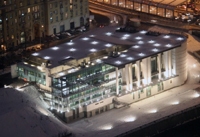 Fomenko Studio Theatre
Fomenko Studio Theatre
While the theatre’s official founding was in 1993, its true beginning goes back to 1988 when People’s Artist of Russia Peter Fomenko gathered a group of star students from his training workshop at the Russian Academy of Theatre Arts. Since its infancy the troupe of young actors, under the guidance of Fomenko, have gained numerous awards and recognition for their creative adaptations of mostly Russian classics. In 2008, two decades after the collective’s first performances, the Fomenko Studio Theatre moved out of their old, renovated cinema, and into a new, modern facility overlooking the Moscow River.
address: 29, Naberezhnaya Tarasa Shevchenko, Moscow
metro: Kutuzovskaya
website: Fomenko.Theatre.ru
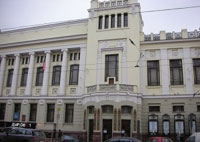 Lenkom Theatre
Lenkom Theatre
One of Moscow’s most well-known theatres, the Lenkom is recognized for its creative enthusiasm, innovation, bold experiments and longevity. Officially started under the name Theatre for Working Youth (TRAM) in 1927, the building itself has been staging theatrical performances since it was built in 1907 to house a Merchant’s Club. The Soviet youth theatre later went by the name Moscow Leninist Komsomol Theatre, which earned it the nickname LENKOM (LENinist KOMsomol), which eventually (post Soviet Union) became its official name. Staging both classical and contemporary plays, plus some outstanding musicals, there are few theatres in Moscow that can compete with its exceptional stage direction or acting.
address: 6, ulitsa Malaya Dmitrovka, Moscow
metro: Tverskaya, Chekhovskaya, Pushkinskaya
box office: daily 12 noon – 7pm (3pm – 4pm break)
website: Lenkom.ru
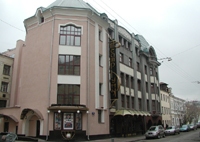 Luna Theatre
Luna Theatre
Founded in 1992 by current director Sergei Prokhorov, Luna Theatre (“Theatre of the Moon”) – as expressed by its very name – stages performances about poetry, love and deceit, mystery and secrecy. Adhering to a strong tradition of the Romantic style, Prokhorov and his cast offer their audience novel versions of the well-known works that excite the imagination with their audacity, skill and spontaneity. Combine this with a modern, fully equipped theatre building that the troupe has called home since 2004, and its little wonder why Luna enjoys such a strong following amongst Moscow theatre goers.
address: 31, ulitsa Malaya Ordynka, Moscow
metro: Tretyakovskaya – then strait down ul. Malaya Ordynka
box office: daily 12:30pm – 7:30pm (3pm – 4pm break)
website: LunaTheatre.ru
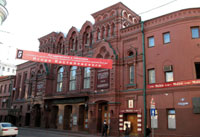 Mayakovsky Theatre
Mayakovsky Theatre
Mayakovsky Theatre, officially called Moscow Academic Theatre named in honor of Vladimir Mayakovsky, is one of the oldest and most respected theatre companies in the Russian capital. The theatre building dates back to 1886 at which time it staged performances of eminent foreign artists, while the theatre company itself can be traced back to 1922 when it was known as the Theatre of the Revolution. Initially used to stage propaganda productions on Soviet themes, it now offers a broad repertoire of foreign and Russian classics, supported by a well-regarded cast of talented actors.
Main and Small Stages
address: 19, ulitsa Bolshaya Nikitskaya, Moscow
metro: Arbatskaya – then walk down Nikitskiy bulvar to ulitsa Bolshaya Nikitskaya
Branch on Sretenka
address: 21, Pushkarev pereulok, Moscow
metro: Sukharevskaya – then walk down ulitsa Sretenka, to Pushkarev pereulok
box office: daily 12 noon – 7pm (3pm – 4pm break)
website: Mayakovsky.ru
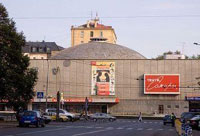 Moscow Academic Theatre of Satire
Moscow Academic Theatre of Satire
Founded in 1924, the Moscow Academic Satire Theatre presently stages performances at the pre-revolutionary circus building of the Nikitin brothers on Triumphalnaya square. Converted from a circus to a theatre building in 1963, some of Russia’s best actors have delighted audiences on its stage. While focusing on comedy, the Moscow Theatre of Satire performs a diverse repertoire that includes more serious dramatic works as well.
address: 2, Triumphalnaya Ploshchad, Moscow
metro: Mayakovskaya
box office: daily 10am – 8pm (3pm – 4pm break)
website: Satire.ru
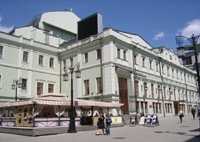 Moscow Art Theatre
Moscow Art Theatre
Established in 1898, the Moscow Art Theatre is one of Moscow’s oldest drama theatres and one of the most influential in all of Russia. It was here that theatre founders – actor and director Constantin Stanislavski, along with playwright and director Vladimir Nemirovich-Danchenko – introduced method acting. Now named in honor of Anton Chekhov, the theatre staged Chekhov’s The Seagull in its opening season. So successful was the production, the MAT adopted the seagull into its emblem. In addition to the theatre’s repertoire of classical and contemporary works, this treasure of Russian culture also hosts an acting studio-school and a small onsite museum (which includes historic relics within make-up rooms used by the theatre’s early actors and directors).
address: 3, Kamergersky pereulok, Moscow
metro: Teatralnaya
box office: daily 12noon – 7pm
website: MXAT.ru, Art.Theatre.ru
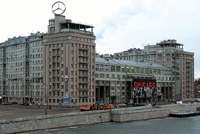
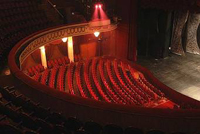
Moscow Variety Theatre
Founded in 1954, the Moscow Variety Theatre has been responsible for developing many of Russia’s great actors and comedians. While comedy makes up a large part of its performances, you can also find more serious dramas, kids shows and musicals as well.
address: 20/2, Bersenevskaya Naberezhnaya, Moscow
metro: Kropotkinskaya
box office: daily 11am – 8pm (no lunch break)
website: Teatr-Estrada.ru
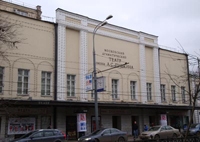 Pushkin Drama Theatre
Pushkin Drama Theatre
Pushkin Drama Theatre was officially born in 1950, while the theatre building itself dates back to the 18th century. On its main stage, established directors and actors put on a broad range of works from classic Russian drama (including excellent adaptations of Chekhov, Gogol and Pushkin) to performances of more contemporary works. The small stage, alternatively, showcases performances of young, up-and-coming artists.
address: 23, Tverskoy bulvar, Moscow
metro: Pushkinskaya
box office: daily 12 noon – 7pm (3pm – 4pm break)
website: TeatrPushkin.ru
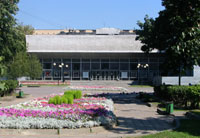 Satirikon Theatre
Satirikon Theatre
One of Moscow’s most popular theatres, the Satirikon attracts capacity crowds with its experimental, vivid and wildly entertaining performances. Under the directorship of Konstantin Raikin (son of the theatre’s creator – renowned Soviet comedian Arkady Raikin), the Satirikon stages a versatile repertoire of satirical productions – mainly of foreign dramas. Housed in a remodeled cinema on Sheremetyevskaya street, the theatre also takes part in festivals and tours throughout Russia and abroad.
address: 8, ulitsa Sheremetyevskaya, Moscow
metro: Maryina Roshcha
box office: daily 11am – 8pm (3pm – 4pm break)
website: Satirikon.ru
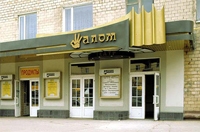 Moscow Jewish Theatre “Shalom”
Moscow Jewish Theatre “Shalom”
Opened in 1988, the Moscow Shalom Theatre takes one back to a day when Jewish theatre (in Yiddish language) thrived in Russia and eastern Europe. Today it is Russia’s only professional Jewish theatre. Staging plays about contemporary issues in the Jewish community, spectacles abound with music, dance and Jewish humor. Artistic director Alexander Levenbuk proudly asserts that Shalom is “the last Jewish theatre in the world to retain a broad appeal to non-Jewish audiences”. Due to the passing of old Yiddish speaking generations, as well as a dwindling Jewish audience due to emigration, the theatre has moved to Russian as its main language. With its diverse Russian repertoire (which includes excursions into Yiddish and simultaneous translation into English), the theatre has gained praise not only in Moscow, but throughout Russia, the CIS, Europe and North America.
address: 71, Varshavskoe Shosse, Moscow
metro: Varshavskaya
box office: daily 12 noon – 7pm
website: Shalom-Theatre.ru
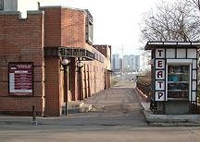 South-West Moscow Theatre
South-West Moscow Theatre
The South-West Moscow Theatre has been a central component of the capital’s cultural life since its founding in 1977. Performing a broad repertoire of classics and contemporary plays (from Shakespeare and Bulgakov to Edward Albee and Venedict Yerofeyev), the theatre is a regular participant in international festivals, workshops, and exchange programs. Such a broad-minded approach not only helps foreigners become acquainted with Russian drama, but acts as an excellent venue for Muscovites to see productions of foreign origins as well.
address: 125, prospekt Vernadskovo, Moscow
metro: Yugo-Zapadnaya
box office: daily 2pm – 8pm
website: Teatr-UZ.ru
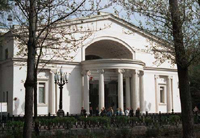 Sovremennik Theatre
Sovremennik Theatre
Since its foundation in 1956 by a group of students from the Moscow Art Theatre studio-school, Sovremennik (which literally means “contemporary”), has been a venue to address current affairs and a voice against official propaganda. While staging some classical dramas, many other acts staged at Sovremennik are written specifically for the theatre, by modern authors, on present-day topics – a characteristic that sets it apart from many of its peers.
address: 19a, Chistoprudny bulvar, Moscow
metro: Chistyie Prudy, Turgenevskaya
box office: daily 12 noon – 7:30pm (3pm – 4pm break)
website: Sovremennik.ru
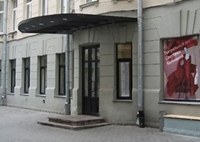 Tabakov Studio Theatre
Tabakov Studio Theatre
Formed in 1986, and staging its first play “Chair” (based on the novel by Yuri Polyakov) the following spring, the Tabakov Theatre was one of the first studio collectives in Russia to receive state subsidies. Since the theatre’s start, founder and director Oleg Tabakov, along with his talented company of actors, have compiled a repertoire of just over 30 titles. Many of these plays, from both domestic and foreign playwrights, have gained critical acclaim and received awards for cast performances and directorship. The theatre troupe has also taken their show on the road, touring abroad and participating in numerous prominent international theatre festivals.
address: 1a, ulitsa Chaplygina, Moscow
metro: Chistyie Prudy
box office: daily 11am – 7pm
website: Tabakov.ru
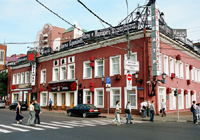 Taganka Theatre
Taganka Theatre
Located in the Art Nouveau building on Taganka Square, the theatre was one of the most popular, controversial and important theaters of the Soviet era. Officially founded on April 23, 1964 when director, Yury Lyubimov staged Bertolt Brecht’s play The Good Person of Setzuan, the theatre often found itself in trouble with Soviet authorities who banned many of Lyubimov’s productions for being too provocative. Finally in 1984 Lyubimov was stripped of his Soviet citizenship and exiled to London. Even with his short absence (returned in 1989), the theatre remained one Moscow’s favorites and continues to stage excellent contemporary productions.
address: 76/21, ulitsa Zemlyanoi Val, Moscow
metro: Taganskaya, Marksistskaya
box office: daily 12 noon – 8pm (no lunch break)
website: Taganka.org, Taganka.Theatre.ru
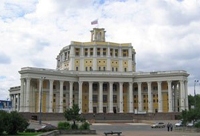 Theatre of the Russian Army
Theatre of the Russian Army
Established in 1929 as the Theatre of the Red Army, today’s theatre company is more appropriately named the Theatre of the Russian Army. The actual building, constructed in 1934, is the largest theatre in Moscow. The Big Hall of the theatre has seating for 1100 spectators, while its huge stage (6 meters wider than the Bolshoi Theatre’s), allows for the production of monumental spectacles. In Soviet times everything from mock warships to real-life battle tanks were used on the stage. Today, the theatre performs a repertoire of both Russian plays and western classics.
address: 2, Suvorovskaya Ploshchad, Moscow
metro: Novoslobodskaya
box office: daily 12 noon – 7pm (3pm – 4pm break)
website: CATRA.su
Saint Petersburg Drama Theatre
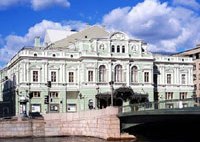 Tovstonogov Bolshoi Drama Theatre
Tovstonogov Bolshoi Drama Theatre
One of Russia’s most famous drama theatres – both for the quality of its productions, and for its historical home on the bank of the Fontanka River – is the Tovstonogov Bolshoi Drama Theater. Staging its first performance on February 15, 1919, the theatre is currently named after People’s Artist of the USSR Georgy Tovstonogov (who served as its director from 1956 until his death in 1989). With a varied repertoire of Russian and international classics and contemporary works, many say the quality of productions have diminished since the great director’s passing. To be fair, plays are still of very high quality and a visit is more than deserving if nothing more than to see one of St Petersburg’s most splendid theatre buildings.
address: 65, Naberezhnaya reki Fontanki, St Petersburg
metro: Sennaya Ploshchad
box office: daily 11am – 7pm (3pm – 4pm break)
website: BDT.spb.ru
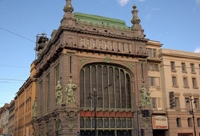 Akimov Comedy Theatre
Akimov Comedy Theatre
Housed in the historic 1903 constructed Eliseev building (on the floor over the food emporium), is St Petersburg’s favorite comedy theatre. Established in 1929 as the Leningrad Theatre of Satire and Comedy, in 1935 it received a shortened name, the Leningrad Theatre of Comedy – and more importantly – a creative new artistic director by the name of Nikolai Akimov. Heading the comedy troupe until his death in 1968, the renowned director instilled a legacy of expressiveness, imagination and audacity that remains with the theatre to present. Patrons of the 883 seat theatre, named in Akimov’s honor since 1989, can enjoy novel, first rate comedies that include both classical and contemporary plays.
address: 56, Nevsky prospekt
metro: Nevsky Prospekt or Gostiny Dvor
box office: daily 11:30am – 7:30pm (3pm – 4pm break)
website: Komedia.spb.ru
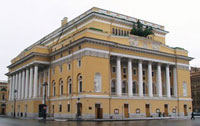 Alexandrinsky Theatre
Alexandrinsky Theatre
Also known as the Russian State Pushkin Academy Drama Theater, Alexandrinsky Theatre is one of the oldest and most respected drama theatres in all of Russia. Founded in 1756, the theatre has occupied its current location (part of a UNESCO World Heritage Site) on Alexandrinsky Square since 1832. Today the “theatre of masters” is most recognized for its drama productions, but also stages excellent ballet performances as well.
address: 2, Ploschad Ostrovskovo (just off Nevsky Prospekt)
metro: Gostiny Dvor
box office: daily 11am – 7pm (2pm – 3pm break)
website: Alexandrinsky.ru
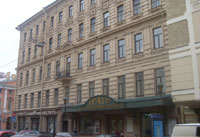 Komissarzhevskaya Theatre
Komissarzhevskaya Theatre
In 1959 the drama theatre was named in honor of renowned Russian actress Vera Komissarzhevskaya (1864-1910). Its true origins, nevertheless, go back to 1942 when a troupe under the name Blockade Theatre, started to stage plays in the besieged city of Leningrad. Recognized for lifting the spirits of Leningrad citizens and soldiers during the city’s darkest years, the theatre continues to stage plays in its original residence – an 1848 constructed shopping complex and concert hall known as the “Passage”. Performances vary from works of contemporary authors to distinctive interpretations of foreign and Russian classics. One of St Petersburg’s most popular drama theatre’s, the 885 seat venue is known to sell out, particularly for premieres.
address: 19, ulitsa Italyanskay
metro: Nevsky Prospekt or Gostiny Dvor
box office: daily 11am – 7pm
website: TeatrVFK.ru
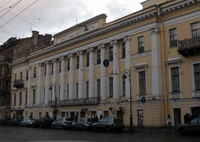 Lensovet Theatre
Lensovet Theatre
Founded as the New Theatre in 1933, and renamed to its current name in 1953, Theatre Lensovet stages one of the most versatile repertoires in St Petersburg. While its true they perform many classical plays, the theatre also devotes special attention to bold new experimental plays (in the tradition of its Avant-Garde roots established during the theatre’s infancy in the early 1930s).
address: 12, Vladimirskiy prospekt, St Petersburg
metro: Vladimirskaya
box office: daily 11am – 7pm (3pm – 4pm break)
website: Lensov-Theatre.spb.ru
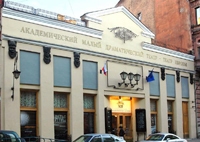 Maly Drama Theatre
Maly Drama Theatre
One significant date for the Maly Drama Theatre is 1944, the year the small, newly formed troupe began performing in war ravaged towns and villages of Leningrad Oblast. Another historical date was 1956, the year the company began performing in its current home – the former Trinity Theatre (built in 1911). Perhaps its most significant point in time, the event that helped transform the Maly Drama Theatre into the world renowned ensemble it is today, is 1975. This is the year celebrated Russian theatre director Lev Dodin staged his first work at the Maly. Appointed chief art director in 1983, the theatre has since staged dozens of plays that have earned international acclaim. Today, St Petersburg’s revered theatre continues to please spectators with its diverse repertoire of works from well-known authors of both foreign and domestic origin. Many of these plays sell out early, so if you want a seat to either the main stage or chamber stage (performances by the Young Studio Theatre), be sure to book in advance.
address: 18, ulitsa Rubinshteyna, St Petersburg
metro: Dostoevskaya
box office: daily 12 noon – 7:30pm
website: MDT-Dodin.ru
Kiev Drama Theatre
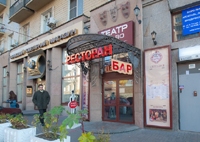 Kiev Drama Theatre Bravo
Kiev Drama Theatre Bravo
The brainchild of founder and director Lyubov Titarenko, Bravo is Kiev’s first private commercial theatre. Staging a broad repertoire of mainly comedies by modern Ukrainian and foreign playwrights, the underlying theme of most plays is the relationship between men and women. Striving to answer life’s most contentious questions regarding love, passion and sincerity, performances are warm and life-celebrating, leaving the audience with an optimistic outlook. As it turns out, the private Russian language theatre that was once “doomed for failure” by skeptics, is now so immensely popular with Kiev theatre goers, that performances regularly sell out in advance.
address: 79, Olesya Gonchara street, Kiev
metro: Universytet
box office: daily 12 noon – 7:30pm
website: Teatr-Bravo.kiev.ua
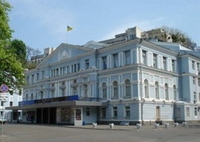 Ivan Franko National Academic Drama Theatre
Ivan Franko National Academic Drama Theatre
The Ivan Franko Drama Theatre can be traced back to early 1920 when a young troupe of actors, headed by Ignat Petrovich Yura, started to stage performances in the city of Vinnitsa. Moving to Kharkov from 1923-1926 (then capital of Ukraine), it again relocated to its current home in the historic 1898 constructed theatre overlooking Kiev’s Ivano Frankovsk Square. Earning the status Academic Theatre (1940) and National Theatre (1994), its Ukrainian language repertoire includes both classical and modern drama, comedy and musical performances.
address: 3, Ploshcha Ivana Franka, Kiev
metro: Khreschatyk
box office: daily 10am – 7pm (Mondays 12 noon – 7pm)
website: FT.org.ua
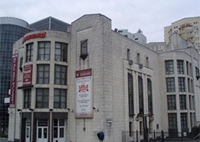 Kiev Academic Theatre of Drama and Comedy
Kiev Academic Theatre of Drama and Comedy
Founded in 1979 on the initiative of prominent artistic director Edward Mitnizky, the Kiev Academic Theatre of Drama and Comedy on the Left Back of the Dnieper River is an experimental theatre that stages performances in both Russian and Ukrainian languages. Its extensive repertoire of contemporary and classical plays, from foreign and domestic playwrights, are given creative, intelligent, and often provocative spins that break the stereotype of traditional drama. Its a reputation that has earned the theatre troupe numerous awards as well as the opportunity to participate in international drama festivals and theatrical meetings at home and abroad.
address: 25, Brovarsky prospekt, Kiev
metro: Livoberezhna
box office: daily 10am – 8pm (3pm – 4pm break)
website: Drama-Comedy.kiev.ua
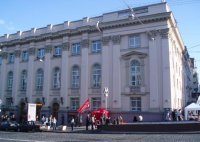 Lesya Ukrainka Theatre of Russian Drama
Lesya Ukrainka Theatre of Russian Drama
The historic home of the Russian Drama Theatre, originally known as Bergognie’s House, dates back to 1875 when it initially housed a circus. Also home to the theatre’s predecessor, the Solovtsov theatrical troupe, it was Soviet authorities who ultimately created the official Theatre of Russian Drama in 1926. Originally used to support Socialist ideologies, the theatre, nevertheless, has been an incubator of many great actors, writers and directors since its beginning. Named in 1941 after renowned Ukrainian poet Lesya Ukrainka (1871-1913), and given the status of Academic Theatre in 1966, the present day Russian language theatre has gained national and international acclaim for its interpretation and presentation of classical and modern playwrights.
address: 5, Bogdana Khmelnitsky street, Kiev
metro: Teatralna
box office: daily 10am – 8pm (3pm – 4pm break)
website: RusDram.com.ua
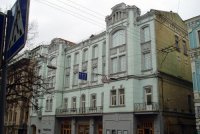 Young Theatre
Young Theatre
Upon its founding in 1979, the Kiev Academic Youth Theatre, though tightly regulated, immediately exhibited a wide range of creative potential. Kiev’s theatre audience was pleasantly surprised with the troupe’s unusual form of artistic style and fresh, new look. In order to pay tribute to this creative approach, the company changed its name from “Youth Theatre” to “Young Theatre”, in 1995. The latter, after all, was the name of the experimental (though short-lived) theatre opened in 1916 by legendary Ukrainian director Les Kurbas (1887-1937). Honoring its legacy, the Young Theatre continues to work with innovative writers, directors and actors to produce a repertoire of daring new and classical productions.
address: 17, Prorizna street, Kiev
metro: Khreschatyk, Zoloti Vorota, Teatralna
box office: daily 11am – 7:30pm (3:30pm – 5pm break)
website: Molody.kiev.ua
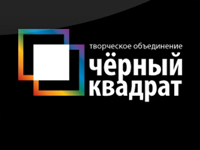 Cherny Kvadrat
Cherny Kvadrat
Cherny Kvadrat, or “Black Square”, is a very popular theatre of improvisation that emerged onto Kiev’s arts scene in the early 1990s. While generally associated with improv, its repertoire also includes contemporary acts, experimental theatrical projects and even academic plays. Serving as a studio-theatre where young artists can study acting and improvisation, Cherny Kvadrat has gained well deserved recognition both at home and abroad. The recipient of frequent awards at international festivals, its also, without a doubt, one of the most popular modern theatrical arts venues in Kiev.
Small Stage (experimental)
address: 27, Shevchenko boulevard, Kiev
metro: Universytet
box office: no advance tickets – pay entrance fee at door
House of Artists (Large Stage)
address: 1-5, Artema street, Lviv Square, Kiev
metro: Khreschatyk – leave metro and walk along Mykhailivska str. to V. Zhitomir str., then follow to Lviv Square
Chamber Stage
address: 5b, Artema street, Kiev (behind House of Artists)
metro: Khreschatyk
box office: weekdays 1pm-8pm, Fridays 1pm-6pm (6pm-7pm in foyer of House of Artists), Saturday 6pm-7pm in foyer of House of Artists (only on days when there is a performance)
website: ArtKvadrat.com

